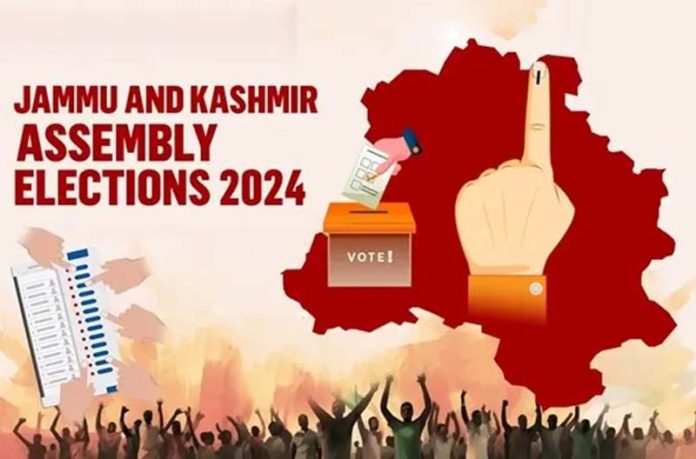B L Saraf
After a ten years long enforced silence people in Jammu and Kashmir have spoken through the medium of a ballot. Spoken, some may call it in a divisive language but to many it is on the predicted lines. Kashmir has loudly spoken in favour of National Conference while as plains of Jammu have preferred BJP’s program. Having gone through the trying times, trauma of violence, the regional divide and perceived sense of injustice and victimhood, it is really a tribute to the people, particularly living in the Valley, to have come out and enthusiastically participated in a festival of democracy.
Like it or not, the verdict is on communal lines. But then there is a silver line. National Conference (NC) – essentially Kashmir based political party – has cut across the regional, societal and sectarian considerations, in as much as the party has carried along with all sections of the Kashmir society and redefined its presence in Jammu’s hilly sub regions. Party’s poll performance in Kashmir is a testimony to its enduring appeal to the people. By registering victories in Ramban and Nowshera (where BJP UT president fell causality to a electoral battle) NC has demonstrated its pan J K acceptance. The party has a significant presence in Ladakh region also, where an independent candidate (NC rebel) won a Parliamentary seat in June election.
Omar Abdulla, who is all set to occupy Chief Minister’s chair, has declared that he and his Government would do all that is required to instill a ” feeling of owner ship ” among the Jammu people so far as governance matters are concerned. This assertion is welcome and timely. However, the declaration has to be matched by an action on the ground. Of many lessons the Assembly verdict has flagged , the one with respect to inter – region relations is of prime importance. Mutual dialogue tampered with utmost sincerity on the part of both Kashmir and Jammu leadership is need of the hour Surely, relations between two regions require re negotiation with an open mind.
Onus is on Omar Abdullah to take the initiative .BJP and other political players of the Jammu region must take a call in the larger interest of J &K. Many scars which have affected regional relations require healing up. The fissures which got deepened after 5/8 / 2019 developments must be filled with mutual trust . The administrative and legislative actions that were set in motion by the MHA added to the impression that there was very little left which the two regions could share in common. Abandonment of time tested annual ” Darbar Move “, a visionary practice adopted by the Dogra Rulers to inculcate a sense of belonging among the people of two divergent regions, is one such example. Stopping practice of Darbar Move may have saved some crores but the loss it inflicted in terms of social and emotional disconnect between the two peoples have been immense. Not discounting, though, the economic loss it caused to the business community of Jammu. Attempt must be made to reinstate the practice.
By design or by default, the voting pattern in Kashmir, Pir Panchal and Chenab Valley in Jammu region has brought the idea of Greater Kashmir to the fore which reminds one of the infamous Dixon Plan of 1950.Dixon, on the instigation of U NO had suggested the apportionment of State, including Ladakh and POJK, between India and Pakistan, except the Kashmir Valley and some portions of Chenab valley and some areas of Pir Panchal- in Jammu region. The notion must be dispelled.
Message of the Assembly election is clear – that people in Kashmir do nurse a discontent and are not happy with the5/8 constitutional tinkering which denuded them of the left over autonomy and reduced a Class 1 state to a big Municipality. As stated earlier in these columns, their silence was not a sign of acquiescence or acceptance but only tactical. They waited for a democratic opportunity to give vent to their hurt feelings which Assembly Election 2024 provided them and they used it to the hilt.
None of the BJP candidates in Kashmir Valley could make it to the Assembly. Nor did those whom people in the Valley characterizedas ” the hybrid leaders propped up after 2019.”The party should care to understand that there has been consolidation of votes against the BJP. In order to find some space in Kashmir party must reinvent itself and fine tune its rhetoric to the ground realties. Kashmir is still a barren ground for the lotus to bloom. Amit Shah admitted it when he was asked to explain why BJP didn’t field a candidate in the Valley for parliamentary election. What Shah said in May 2024 came true in October 2024.
The tide of the religious divide has to be stemmed. There are positive signs that it can be done. The important takeaway of the recent election is that Kashmiris have reaffirmed faith in a democratic polity. The election result does give some hope to the people that all is not lost. Something can be retrieved. N C still retains something of its core agenda. That is the cultural syncretism , which in common parlance is called Kashmiryat.
The internally displaced Kashmiri Pandits may have to revisit their attitude vis -a vis the regional party which has come to rule J &K and rethink how long they will go on treading a path of self delusion . For them, it is time to recalibrate the stance and strategy in order to reclaim right of ownership and possession of their homeland.
(The author is former Principal District & Sessions Judge)
Trending Now
E-Paper


